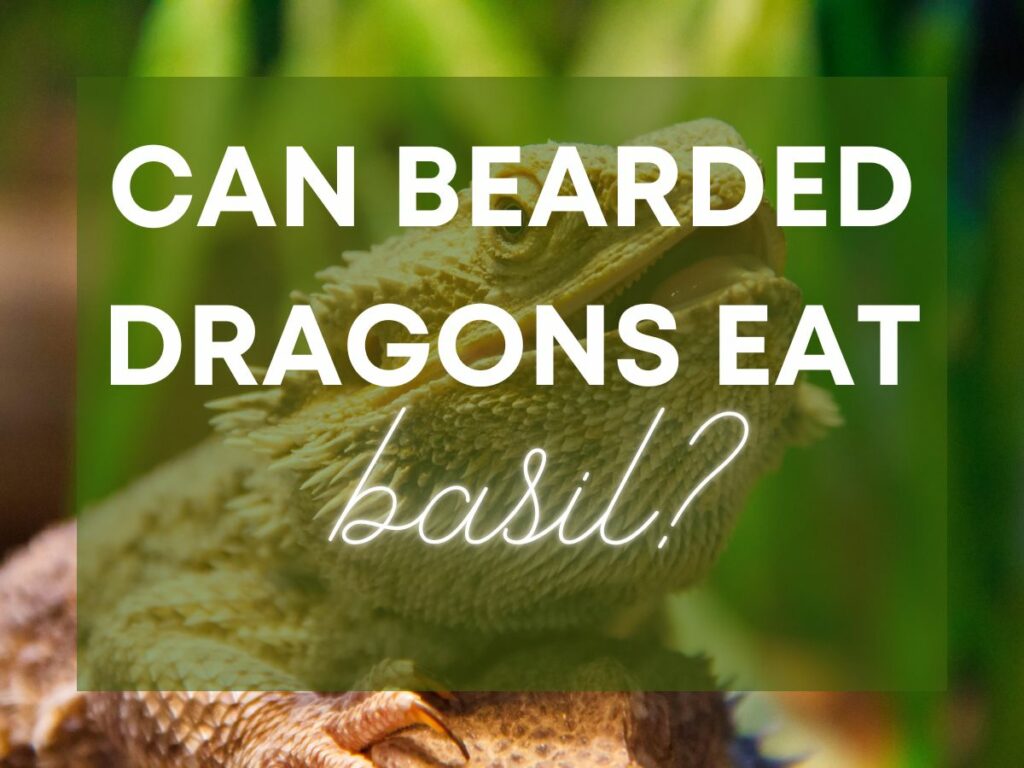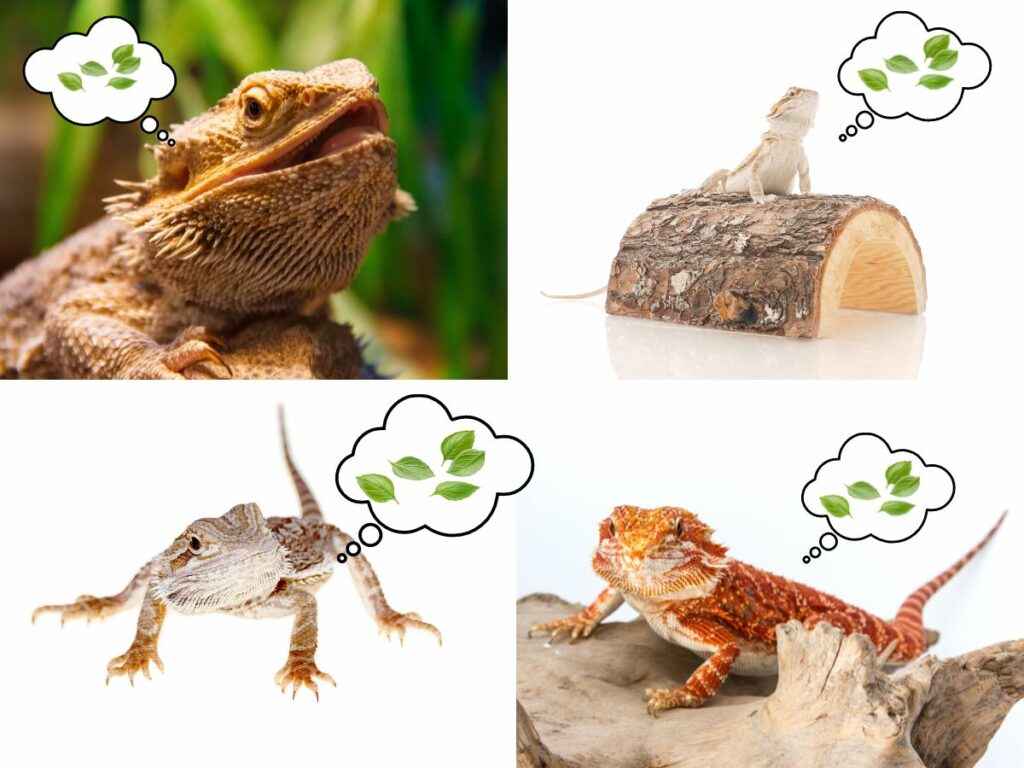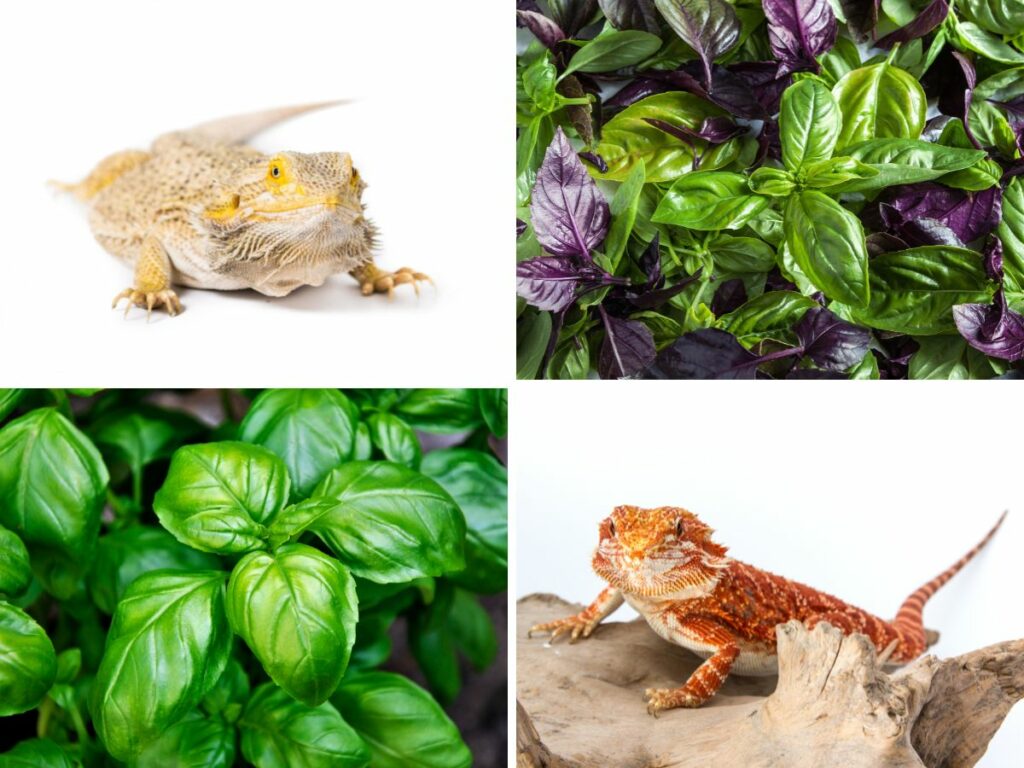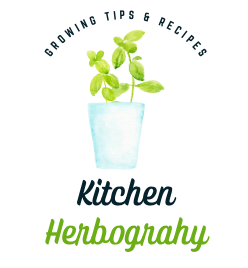As an Amazon Associate I earn from qualifying purchases. This website also participates in other affiliate programs and may earn commissions if you shop through the links used on this website.
(This article was originally published on August 22, 2022 and was last updated on August 22, 2022)
Bearded dragons are a popular pocket pet lizard and fairly straightforward to look after.
Staple food for bearded dragons includes calcium-rich greens, insect proteins, and fresh leaves.
But, can reptile lovers include basil in a bearded dragon’s diet to help keep it interesting for them?
In this article, you can read everything you need to know about feeding basil to your bearded dragon.
DISCLAIMER: This blog post is not intended to be veterinary or professional advice. If in doubt, speak with your veterinarian about your pet.
Can Bearded Dragons Eat Basil?
Yes, bearded dragons can eat basil. Basil plants can be included as part of a balanced diet for bearded dragons and can provide valuable nutrients.
However, it’s important to feed basil sparingly, as too much can cause more harm than good.
As with feeding basil to your cat, dog, rabbits, or guinea pig, think of basil more as an interesting treat in a lizard’s salad rather than something which provides them with many benefits.

How to Feed Your Bearded Dragon Basil
How to Prepare Fresh Basil for Your Beardie
To prepare basil:
- Thoroughly wash a few basil leaves
- Cut them into small pieces
- Mix them inside your bearded dragon’s regular meal as a special treat
- Watch your beardie eat fresh basil and (hopefully) enjoy it!
Note, it’s best your bearded dragon eats fresh basil that is organic – i.e. grown without any pesticides and chemicals sprays.
Can Bearded Dragons Eat Dried Basil?
Fresh basil leaves are better than dry basil for bearded dragons. This is due to the fact that calcium is less concentrated in fresh basil leaves than in dried basil, and excess calcium is problematic for bearded dragons.
In general, fresh forms of staple greens are always preferable to dried ones when it comes to bearded dragons.

Dried forms of anything are far more concentrated, and make it harder to control the level of nutrients your beardie receives.
Can Bearded Dragons Eat Basil Seeds?
Basil seeds have a very rough texture, which means your bearded dragon may have a hard time chewing them.
It’s best to skip the basil seeds, and give your beardies fresh organic basil leaves only.
Can Bearded Dragons Eat Basil Flowers?
Yes, bearded dragons can eat fresh basil flowers as a treat.
Risks And Benefits of Feeding Your Bearded Dragon Basil
Before including any new food in a lizard’s diet it’s important to understand its nutritional value and associated risks.
As tasty as basil may be for us humans, it doesn’t necessarily mean that it has all the nutrients bearded dragons require.
Similarly, it’s good for bearded dragon owners to understand any risks fresh basil can pose for a bearded dragon.
Even though dragons can eat basil, in the wrong amounts or in the wrong form (e.g. dried basil), it can cause problems.
When adding any new components to a pet’s diet, it’s best to perform a small allergy test first – even though allergic reactions in bearded dragons are very rare.
This involves giving a decreased amount and waiting 24 hours to check for signs of reactions.
Signs of bad reactions to food in bearded dragons can include:
- Diarrhea
- Stomach pain
- Behavioral changes
- Weakness
- Decreased appetite
If you notice any of the above changes in your bearded dragon, it’s best to contact your vet.
Risks of Basil in a Dragon’s Diet
Calcium Balance
Getting the right calcium levels in your beaded dragon’s diet is essential to their overall health and well being. As a high calcium herb (fresh basil leaves have an estimated 4.4mg of calcium per 5 fresh leaves), it’s worth being aware of how your dragon’s calcium intake is effected if they eat fresh basil.
Hypercalcemia
High calcium greens, such as basil, contain some vital nutrients for bearded dragons.
However, going over the daily calcium quota for bearded dragons can be disastrous.
Excess calcium in a beardie’s diet can be caused by:
- Overfeeding calcium supplements or calcium-rich plants alongside vitamin D3 (which is essential for the absorption of calcium)
- Too much exposure to UVB light
As excess calcium can make bearded dragons unwell, you’ll want to ensure you don’t overfeed your dragon basil, in addition to a calcium supplement and other high calcium greens.
Hypocalcemia and Metabolic Bone Disease
Calcium plays an essential role in blood clotting, muscle contraction, and the hardening of bones. Too little of this essential nutrient can also cause significant problems for bearded dragons.
Hypocalcemia (low blood calcium levels) can be caused by:
- Inadequate vitamin D3 intake – this vitamin enables calcium (and also phosphorus) to be metabolised
- Overfeeding of specific vegetables – spinach and beet greens contain compounds called ‘oxalates’ which can prevent the absorption of calcium.
- Inappropriate phosphorus ratio – phosphorus, like oxalate described above, also stops calcium from being absorbed.
You can read more about calcium and vitamin D3 in this article.
When the calcium level remains low for some time, a bearded dragon’s body starts to mobilise calcium stores from its bones. This condition is called metabolic bone disease and has severe consequences.
High Acidity
The acids within basil (such as caftaric, rosmarinic, and chicoric acid) mean that eating lots of basil can cause too much acidic food in the stomach of a bearded dragon.
Replacing Other Necessary Foods
If your bearded dragons eat basil occasionally or as a treat, it’s unlikely to cause them harm.
However, it can become a problem if you feed them basil instead of more typical dragon diet, which could cause a nutrient deficiency or imbalance.
Bearded dragons are classified as ‘omnivores’ which means they eat both plant and animal material.
Fruit and vegetables should make up around 80% of a beardies diet, depending on their age. Of that 80% plant-based diet, around 80% to 90% should be comprised of leafy greens, with the remaining 10-20% coming from fruits or edible flowers (more occasionally). You can include some basil within this portion of their diet.
The remaining 20% of a bearded dragon’s diet should come from store-bought (not wild) insects such as crickets, Dubia roaches, butter or earthworms, or mealworms (for adult dragons only). Never replace the protein portion of your beardie’s diet with basil, as this could result in them not getting enough animal protein to stay healthy.
There are also a few extra components of a bearded dragon’s diet to consider:
- Calcium supplement – special powders containing a healthy calcium amount to be used a couple of times per week.
- Vitamin D3 supplement – this essential nutrient is sometimes included within the powder we mentioned above. Bearded dragons can also get vitamin D3 from UVB light within their enclosures.
- General Mineral supplement – these can be given once per week.
Talk to your reptile veterinarian to find out more information on the supplements needed to best support your bearded dragon.
Benefits of Basil for Bearded Dragons

An enriching treat, basil has the following health benefits for bearded dragons:
- Good for the immune system
- Contains antioxidants (vitamin C) and anti-inflammatory components
- Helps improve kidney function
- Good for bearded dragon eyes (vitamin A)
- Good for blood clotting (vitamin K)
Can Young Bearded Dragons also Eat Basil?
Young bearded dragons can also enjoy basil as a treat alongside their regular, balanced diet.
Because baby beardies are still growing, they have higher protein requirements than adults. Talk with your veterinarian to be sure that your young dragon is getting enough protein, and ensure that any basil treats don’t undermine protein requirements.
Also keep in mind baby bearded dragons need to be fed more frequently (up to 3x per day).
Which Other Herbs can Bearded Dragons Have?
Herbs can provide an interesting change for bearded dragons. Some examples of fresh (not dried herbs) pet parents can feed bearded dragons include:
- Dill
- Thyme – the antibacterial properties can be good to fight common bacteria and parasites in bearded dragons
- Parsley
- Cilantro – has high amounts of vitamins A, C, and K (similar to basil!)
- Fennel
- Lavender
- Rosemary
We recommend reading up about these herbs before incorporating them in your beardie’s diet, similarly to basil they are also acidic.
Final Thoughts About Feeding Basil to Your Bearded Dragon
Does your bearded dragon eat basil or any other herb and seem to enjoy it? Tell us about their favorites in the comments below!
Originally from the UK, Charlotte is an undergraduate veterinary medicine student who will graduate in 2023 from the University of Zagreb, Faculty of Veterinary Medicine. She is a volunteer at her university’s obstetrical clinic, equine clinic and an editor of her university’s scientific journal. She loves to travel and has undertaken internships in veterinary institutions in Belgium, Austria and Spain outside of her veterinary medicine studies within an international program in Croatia. In her spare time she loves taking long walks with her 13-year-old dog Chiki and cooking (basil is one of her favorite herbs!)

